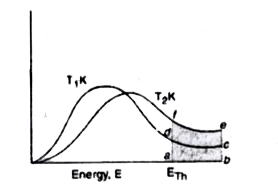What is the effect of temperature on rate of a reaction. Solution in Punjabi
Temperature Coefficient is the ratio of two rates of reactions or rate constants that differ by 10 K.
Temperature coefficient =
For most of the reactions its value is approximately 2. This can be explained as follows.
We know that for the rise in temperature from 300 K to 310 K, the average kinetic energy of the molecules increases by 3% only as it is directly proportional to the temperature. On the other hand, the most reactions, the rate constant doubles i.e., increases by 100% for a C rise near room temperature. This can be explained by assuming that certain threshold energy is required for the molecules to react. This is illustrated in figure where the fraction of the colliding molecules possessing different relative energies is plotted. 
From the figure it is clear that with the increase in temperature the peak of the curve gets shifted towards the right and the curve at lower temperature. This indicates that the number of molecules with higher energy content have increase with increase in temperature.
The minimum energy () required for the effective collisions is also shown in the diagram and the number of molecules possessing energies equal to on greater than bit, is proportional to area abed at temperature and area abef at temperature . In the figure, the area abef is roughly twice as large as abcd. Since the rate of reaction depends upon the number of molecules which possess energies higher than threshold energy (for effective collisions), it may be interpreted that the fraction of molecules possessing energy more than threshold energy has increased approximately two times and thereby, increases the rate by two times for a rise in temperature of 10 K.
Thus, we may conclude that increase in the rate of reaction with the rise in temperature is mainly due to the increase in number of effective collisions.
Topper's Solved these Questions
- CHEMICAL KINETICSBOOK - BETTER CHOICE PUBLICATIONCHAPTER - CHEMICAL KINETICSEXERCISE - Numerical Problems
63 Videos
- BIOMOLECULES BOOK - BETTER CHOICE PUBLICATIONCHAPTER - BIOMOLECULES EXERCISE - QUESTION BANK
85 Videos
- CHEMISTRY IN EVERYDAY LIFEBOOK - BETTER CHOICE PUBLICATIONCHAPTER - CHEMISTRY IN EVERYDAY LIFEEXERCISE - QUESTIONS
76 Videos
Similar Questions
The rate constant of a reaction is 1.5×107sec−1 at 50∘C and 4.5×107sec−1 at 100∘C. Calculate energy of the activation for the reaction.
View SolutionCovalent compounds are soluble in
View SolutionWhat is a medicine ?
View SolutionThe effect of temperature on reaction rate is given by
View SolutionWhat is the effect of temperature on the rate constant of reaction? How can this temperature effect on the rate constant be represented quantitatively?
View SolutionWhat is the effect of temperature on reaction rate?
View SolutionWhat is the effect of temperature on the rate of a reaction.
View SolutionWhat is the effect of temperature on the rate constant of reaction? How can this temperature effect on the rate constant be represented quantitatively?
View SolutionWhat is the effect of temperature on the rate constant of a reaction ? How can this temperature effect on rate constant be represented quantitatively ?
View SolutionWhat is the effect of temperature on the rate of a reaction ?
View Solutionअभिक्रिया के वेग पर ताप का क्या प्रभाव पड़ता है?
View SolutionWhat is the effect of temperature on the rate constant of a reaction ? How can this temperature effect on rate constant be represented quantitatively ?
View SolutionWhat is the effect of temperature on the rate constant of reaction? How can this temperature effect on the rate constant be represented quantitatively?
View SolutionWhat is the effect of temperature on the rate constant of a reaction ?How can this effect of temperature on rate constant be represented quantitatively?
View SolutionWhat is the effect of temperature on the rate constant of a reaction? How can this temperature effect on the rate constant be represented quantitatively?
View SolutionWhat is the effect of change of temperature on the rate of reaction?
View Solution
